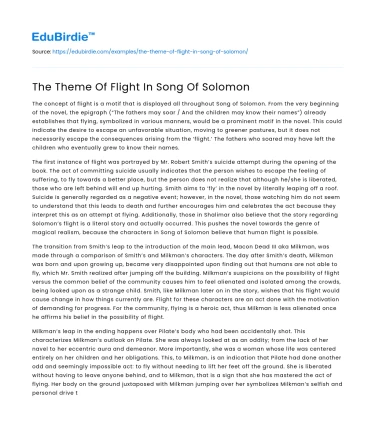The concept of flight is a motif that is displayed all throughout Song of Solomon. From the very beginning of the novel, the epigraph (“The fathers may soar / And the children may know their names”) already establishes that flying, symbolized in various manners, would be a prominent motif in the novel. This could indicate the desire to escape an unfavorable situation, moving to greener pastures, but it does not necessarily escape the consequences arising from the ‘flight.’ The fathers who soared may have left the children who eventually grew to know their names.
The first instance of flight was portrayed by Mr. Robert Smith’s suicide attempt during the opening of the book. The act of committing suicide usually indicates that the person wishes to escape the feeling of suffering, to fly towards a better place, but the person does not realize that although he/she is liberated, those who are left behind will end up hurting. Smith aims to ‘fly’ in the novel by literally leaping off a roof. Suicide is generally regarded as a negative event; however, in the novel, those watching him do not seem to understand that this leads to death and further encourages him and celebrates the act because they interpret this as an attempt at flying. Additionally, those in Shalimar also believe that the story regarding Solomon’s flight is a literal story and actually occurred. This pushes the novel towards the genre of magical realism, because the characters in Song of Solomon believe that human flight is possible.
Save your time!
We can take care of your essay
- Proper editing and formatting
- Free revision, title page, and bibliography
- Flexible prices and money-back guarantee
The transition from Smith’s leap to the introduction of the main lead, Macon Dead III aka Milkman, was made through a comparison of Smith’s and Milkman’s characters. The day after Smith’s death, Milkman was born and upon growing up, became very disappointed upon finding out that humans are not able to fly, which Mr. Smith realized after jumping off the building. Milkman’s suspicions on the possibility of flight versus the common belief of the community causes him to feel alienated and isolated among the crowds, being looked upon as a strange child. Smith, like Milkman later on in the story, wishes that his flight would cause change in how things currently are. Flight for these characters are an act done with the motivation of demanding for progress. For the community, flying is a heroic act, thus Milkman is less alienated once he affirms his belief in the possibility of flight.
Milkman’s leap in the ending happens over Pilate’s body who had been accidentally shot. This characterizes Milkman’s outlook on Pilate. She was always looked at as an oddity; from the lack of her navel to her eccentric aura and demeanor. More importantly, she was a woman whose life was centered entirely on her children and her obligations. This, to Milkman, is an indication that Pilate had done another odd and seemingly impossible act: to fly without needing to lift her feet off the ground. She is liberated without having to leave anyone behind, and to Milkman, that is a sign that she has mastered the act of flying. Her body on the ground juxtaposed with Milkman jumping over her symbolizes Milkman’s selfish and personal drive to fly contrasting with Pilate’s flight being successful without her actually vying to achieve it.
The theme of flight also unfolds as a symbol of a journey of life or, more specifically, the stage of getting mature. The song Pilate sings during the novel’s opening scene with Smith (O Sugarman done fly away / Sugarman done gone / Sugarman cut across the sky/ Sugarman gone home….) foreshadows Milkman’s journey as he searches for means to leave home, become free and independent, and to get to know his roots. Milkman, as represented in the song as Sugarman, finally learns to spread his wings and fly in the end; although this does not come without any costs. Thus, he is symbolically compared to a bird who gets mature and leaves the parental nest.
Leaving Not Doctor Street and traveling to Shalimar meant liberation for Milkman but also caused pain, grief, and eventual heartbreak for Hagar. Likewise, Solomon’s flight to Shalimar caused his freedom from slavery in the cotton fields of Virginia, but in turn, he left his wife Ryna, also a slave, to take care of their twenty-one children. Another is Mr. Smith’s jump, in which he left a note that the suicide as an act committed out of love, but secretly masked with hopelessness and pain. Furthermore, their acts are all ambiguous and open-ended. The leaps of these characters shown in different ways are not purely happy endings; a display of situations not being strictly black or white. The people (particularly women) left hurting certainly do not think of these as happy endings, and not as heroic acts but selfish choices.






 Stuck on your essay?
Stuck on your essay?

